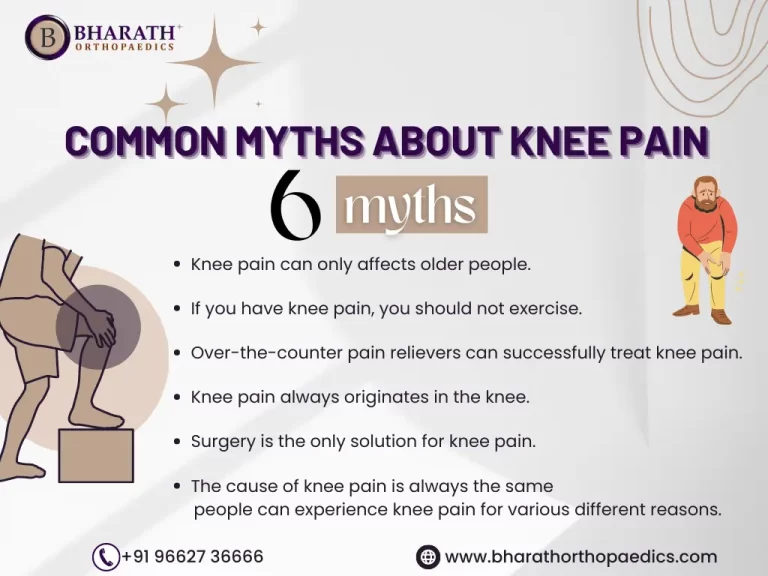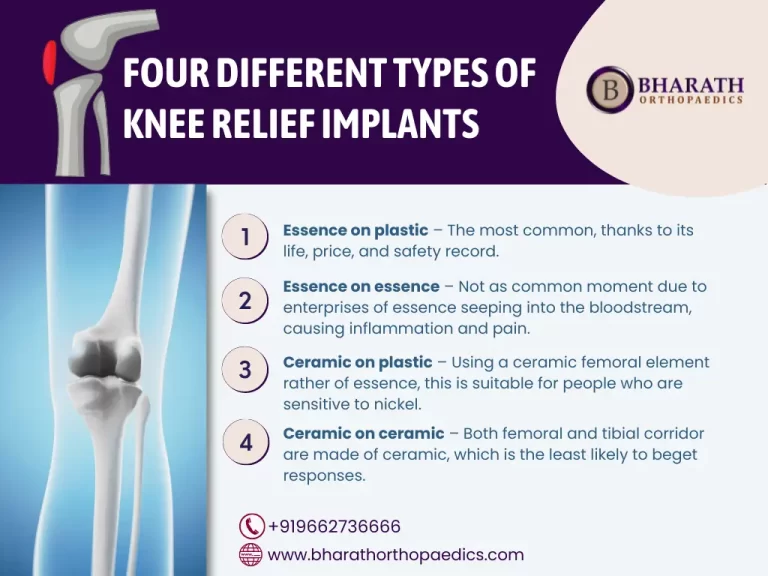Your knees are vital for mobility and have a lot of moving parts. These are the largest joints in the body and they get most easily injured as it is composed of ligaments, tendons, bones, and cartilage. So, when injuries occur, they can lead to weakness or pain in the joint where your activities get limited.
If the pain is minimal, most of them can be cured by physical therapy and medications but when there are complex injuries, it is essential to approach the orthopaedic hospital in Bharath Orthopaedics for getting the best knee replacement surgery in Chennai.
Symptoms of Knee Injury
If you experience any of these following symptoms, you are most likely to have one of the common knee injuries. They include:
- Pain
- Tenderness
- Swelling
- Instability
- Bruising
- Difficulty to bear weight
- Trouble bending the knees
- Clicking or popping noises
- Difficulty moving
These symptoms can vary from individual to individual depending on the type of the severity of the injury. For instance, acute knee injuries may cause more pain and swelling whereas chronic injury or injury due to overuse may cause intermittent pain, clicking, or popping. Mostly for acute knee injuries, you may be required to opt for the best knee replacement surgery in Chennai.

Risk Factors of Knee Injuries
The different factors that can cause the risk of a knee injury may be because:
- Age – Elderly people are at high risk of getting knee injuries as it can be due to falls and diseases like osteoporosis.
- Sports – High-impact sports like running, cycling, soccer, basketball, football, and others can increase the risk of knee pain or injury and if it worsens, the best knee replacement surgery in Chennai is recommended to resume normal activities.
- Disease – Arthritis, osteoporosis, gout, or degenerative joint disease can cause knee injuries such as bursitis.
- Gender – Women are most susceptible to patellar injuries and ACLs due to their anatomy.
- Weight – Excess weight adds additional strain on low extremity joint replacement surgery and also creates a greater risk of a knee injury.
- Overuse – If you are overusing or overstraining your knee besides training incorrectly, during sports and other activities, there is an increased risk of a knee injury which can lead to the best knee replacement surgery in Chennai.
5 Most Common Knee Injuries and Treatment
The knee joint can suffer severe damage during almost any activity, even while sitting down. Here’s what you should know about the 5 most common knee injuries and their treatment.
Meniscal Tears
The meniscus is a thin cartilage rim that acts as a cushion for knee joint replacement. The meniscus may become ruptured or torn in an athletic or other injury and in turn causes severe pain, tenderness, swelling, and a limited range of motion.
Meniscus tears don’t often heal by themselves but respond quickly to physical therapy and other conservative treatments. Arthroscopic knee replacement surgery in Chennai may be necessary for the most severe tears.
Fractures
As you must have known, the three bones – the thigh bone, the shin bone, and the kneecap together make up the knee. If any of these bones can break during a car accident, a fall, or an indirect trauma, the fractured bone can cause heavy pain, severe tenderness, and swelling as well as it can lead to difficulty in walking.
Stable fractures can heal by themselves by taking several weeks or months once set in a cast. On the other hand, displaced fractures require the best knee replacement surgery in Chennai from the orthopaedics hospital to reset the bones. In both cases, recovery will require an extensive physical therapy program for strengthening the joint and regaining the full range of motion.
ACL Injuries
The ACL (Anterior Cruciate Ligament) is considered to be one of the four important knee ligaments that help in stabilizing the knee. The ACL may tear due to a sudden shift of force or direction like sports injuries. A partial or complete tear can cause pain, swelling, knee instability, and a popping sound in the knee.
While partial tears can be treated conservatively in less active patients, active patients suffering from partial or complete tears need arthroscopic knee replacement surgery in Chennai to regain knee joint function.
Dislocations
The patella or kneecap may become dislodged at the bottom of the femur starting from the groove. This is referred to as dislocation and as a result of this, it can cause acute or chronic injury.
If there is severe pain and swelling with restricted motion, then the patient has to check with the orthopaedic surgeon and go for total knee replacement surgery. Most of the patellar dislocations can be stabilized with bracing and result but a repeatedly dislocated kneecap may require the best knee replacement surgery in Chennai.
Tendon Tears
The patellar tendon is the tissue that is responsible for connecting the thigh muscles to the patella. It allows you to straighten and flex your knee. It might become ruptured because of a strong or sudden force, and tear upon an awkward landing or a fall. Partial tears can be treated conservatively with the help of a brace and physical therapy. But a full tear will require the best knee replacement surgery in Chennai.
Both athletes and non-athletes will suffer from a knee injury. If you suffer from acute or chronic knee pain, it is recommended to consult with an experienced orthopaedic surgeon as he/she can help you recover completely.
Treatments for Knee Injuries
With the exception of a severe tear or an obvious fracture that requires the best knee replacement surgery in Chennai, other knee injuries are often treated conservatively with compression, elevation, rest, or anti-inflammatory medications.
If these treatments don’t provide enough pain relief and progress, the patient has to go for knee arthroscopy, a minimally invasive procedure where the surgeon uses a camera to repair the injured knee. If knee problems become chronic, you have to approach the best orthopaedic hospital that provides knee replacements with affordable knee replacement surgery cost Chennai.
TKR (Total Knee Replacement)
Total Knee Relief (TKR) is performed by removing the damaged part of the bones that make up the hip joint and replacing them with essence implants to advance the required support. The best knee replacement in Chennai procedure comes with its own set of pitfalls, and is, thus, carried out only on those cases for whom it’s absolutely necessary.
Prior to total knee relief, you’ll need to do many tests to ensure that you’re an applicable seeker for the procedure. This pre-surgical evaluation will be carried out many weeks before the surgery. occasionally, you’ll need to perform preoperative strengthening exercises or suffer weight loss before the procedure to enhance surgery results.
Procedures or Steps Involved in Best Knee Replacement Surgery in Chennai
Knee replacement surgery, also known as knee arthroplasty, is a major surgical procedure that involves replacing the damaged parts of a knee joint with an artificial implant to relieve pain and improve function. Here are the steps involved in the best knee replacement surgery in Chennai and what you can expect before, during, and after the procedure.
Before Knee Replacement Surgery
Before the best knee replacement surgery in Chennai, your doctor will conduct a thorough medical evaluation to determine if you are a good candidate for the procedure. You may need to undergo several tests, including X-rays, MRI, and blood tests, to evaluate the condition of your knee joint and overall health. Your doctor may also ask you to stop taking certain medications that can interfere with the surgery or increase the risk of bleeding.
You will also receive detailed instructions on how to prepare for the surgery. This may include stopping food and drink at a specific time before the surgery, stopping certain medications, and arranging for transportation home after the surgery.
During Knee Replacement Surgery
The best knee replacement surgery in Chennai typically takes about two hours to complete, but the length of the surgery may vary depending on the complexity of the case. The surgery is performed under anesthesia, which may be general anesthesia or regional anesthesia, depending on your medical condition and preference.
The surgeon will make an incision on the front of your knee and carefully remove the damaged parts of the knee joint. They will then position the artificial implant in the knee joint and use specialized instruments to fix it in place. The implant may be cemented in place or designed to bond directly to the bone over time.
After the implant has been positioned, the surgeon will close the incision with sutures or staples and apply a sterile dressing over the wound. A drain may also be placed to remove excess fluid from the surgical area.

After Knee Replacement Surgery
After the surgery, you will be taken to a recovery room where you will be monitored closely by the medical team. Pain medication and antibiotics may be administered to help manage pain and prevent infection. You will also receive instructions on how to care for the surgical incision and how to perform exercises to help regain strength and mobility in your knee.
You may need to stay in the hospital for a few days to a week, depending on your medical condition and the progress of your recovery. During this time, you will work with physical therapists to regain strength and mobility in your knee joint.
And also, follow a strict rehabilitation plan after the surgery to help ensure a successful outcome. This may include performing exercises at home, attending physical therapy sessions, and avoiding certain activities that can put excessive strain on your knee joint.
It is normal to experience some pain and discomfort after knee replacement surgery, but your doctor can prescribe pain medications to help manage your symptoms. You may also experience some swelling and bruising around the surgical incision, but this should gradually subside over time.
With proper preparation, care, and rehabilitation, many people are able to return to their normal activities with less pain and greater mobility after getting the best knee replacement surgery in Chennai.
Best Knee Replacement in Chennai
Dr. L. Bharath has been at the forefront of innovating smart knee replacement techniques aimed at guaranteeing painless procedures, accelerated recovery, rapid rehabilitation, and reduced post-surgery infection risk. Their team of dedicated and highly qualified orthopaedic surgeons, nurses, and staff is committed to providing the best possible care to their patients, from the intake to bedside manner to post-operative care. Dr. L. Bharath is the best for Knee Replacement in Chennai.
Read also Joint Reconstruction Surgery.
10 Essential Questions to Ask Your Doctor Before Undergoing Knee Replacement
There are many effects that you need to do prior to the surgery if you’re considering knee replacement. First, make sure that your surgery is carried out only by a knee specialist. Once you are aware of it, you can ask your ortho specialist the following questions:
What are the complications of having a knee replacement?
Knee replacement surgery can lead to complications such as infection, blood clots, implant loosening, joint instability, nerve or blood vessel damage, stiffness, or ongoing pain. Rarely, patients may experience allergic reactions or persistent discomfort. Adherence to post-surgery guidelines and regular follow-up care can help mitigate these risks.
Can you tell me what will happen during the surgery?
During knee surgery, the patient is given anesthesia to prevent pain and remains unconscious. The surgeon makes an incision in the knee and repairs or replaces the damaged tissues or components of the knee joint, such as cartilage, ligaments, and bones. The surgery may last a few hours, and after the procedure, the patient may need physical therapy to regain full mobility.
What kind of an implant will be used?
The specific type of implant used depends on the medical or technological context. Medical implants can range from pacemakers and joint replacements to cochlear implants, while technological implants may include neural interfaces or RFID chips. The choice of implant is determined by the intended application and individual patient or user requirements.
What are the types of knee replacement?
There are several types of knee replacement procedures, including:
1. Total Knee Replacement (TKR): Replaces the entire knee joint.
2. Partial Knee Replacement (PKR): Replaces only one part of the knee joint.
3. Revision Knee Replacement: Corrects or replaces a previous knee replacement.
4. Bilateral Knee Replacement: Replaces both knees in a single operation.
5. Custom Knee Replacement: Tailored to an individual’s unique anatomy.
Will I have to endure pain?
Pain operation is part of the post-surgical proceedings. Several pain killers and anti-inflammatory medicines which also include NSAIDS will be used to control pain.
How long will recuperation take?
It is important to understand that the process of returning to your normal life after surgery will not be a quick one. You will likely need to spend several days in the hospital followed by a period of rehabilitation at home.
How soon can I start doing things normally?
It may be necessary to use crutches or walking aids for a period of time after surgery. Engaging in physical activity is essential to regain strength, flexibility, and balance. The time required to return to normal activities varies among individuals and depends on the healing process and the success of the surgical procedure in managing pain.
What will happen if I prolong the surgery?
No pain can be experienced overnight, but with time the pain in your knee is likely to reach the top. Otherwise, there will be continued loss of strength in the knee common area, leading to a problem in maintaining balance.
What would happen if I had to put off surgery for the next 6 to 12 months?
Delaying knee surgery for another 6 to 12 months could lead to a worsening of the knee condition, resulting in increased pain, stiffness, and decreased range of motion. It may also lead to further damage to the joint, making it harder to perform the surgery successfully. It is advisable to consult with a medical professional to determine the best course of action.
Do I have to make any special adaptations to my home?
It is important to ensure that you have a low-level bed that you can use for the initial weeks after surgery. If your home has stairs, it is advisable to declutter and remove any obstacles to minimize the risk of tripping and injuring your newly operated knee while moving around. Installing handrails on both sides of stairs and steps in your home, as well as in the shower or bathtub, can provide additional support and stability during the recovery period.
What are the advantages of Knee replacement surgery?
Knee replacement surgery offers several advantages:
1. Pain Relief: Reduces chronic knee pain and discomfort.
2. Improved Mobility: Restores joint function and mobility.
3. Enhanced Quality of Life: Allows for a more active and fulfilling lifestyle.
4. Correction of Deformities: Corrects joint deformities, improving alignment.
5. Longevity: Offers long-term relief with modern implant materials.
6. Better Sleep: Eases nighttime pain, promoting better sleep.
7. Minimal Recovery: Generally, a quick recovery and return to normal activities.
It’s important to note that the best knee replacement surgery in Chennai is not without risks, and patients should discuss the potential benefits and risks with their healthcare provider before deciding whether to undergo the procedure.
Can Knee replacement help someone with severe Osteoarthritis?
Yes, knee replacement surgery can be an effective treatment for someone with severe osteoarthritis. Osteoarthritis is a degenerative joint disease that occurs when the cartilage that cushions the joints wears down over time, leading to pain, stiffness, and loss of mobility. When conservative treatments such as pain medications, physical therapy, and weight management are no longer effective, knee replacement surgery may be recommended.
During the best knee replacement surgery in Chennai, the damaged cartilage and bone in the knee joint are removed and replaced with an artificial joint. This can provide significant pain relief, improved mobility, and a better quality of life for patients with severe osteoarthritis.
It’s important to note that knee replacement surgery is not appropriate for everyone, and each patient’s individual case must be evaluated by a healthcare provider. Factors such as age, overall health, and the extent of the osteoarthritis damage must be considered when determining whether knee replacement surgery is the best course of treatment.
Treatment For Knee Replacement
Knee replacement, also known as knee arthroplasty, is a surgical procedure that involves replacing a damaged or worn-out knee joint with an artificial prosthesis. The surgery is typically recommended for individuals with severe arthritis, joint damage, or significant knee pain that does not respond to conservative treatments. The procedure aims to improve mobility, reduce pain, and enhance the overall function of the knee. Post-surgery, rehabilitation, and physical therapy are crucial for recovery, helping patients regain strength, flexibility, and range of motion in the replaced knee. This comprehensive approach ensures a successful outcome for knee replacement patients.
What are the causes of knee pain?
Knee pain can result from various factors, including injuries such as ligament tears or fractures, osteoarthritis, rheumatoid arthritis, tendinitis, bursitis, meniscus tears, and overuse injuries. Additionally, conditions like gout or infections may contribute to knee pain. Obesity, improper biomechanics, and aging can also play a role. Accurate diagnosis by a healthcare professional is essential for effective treatment based on the specific underlying cause.
Conclusion
To summarize, if your knee has been bothering you, no matter the type of injury or the course of treatment. You can be assured of getting a reasonable knee replacement surgery cost Chennai, as the experts at Bharath Orthopaedics can be beneficial for you to overcome the problem and help you resume your routine activities.
Read also Hip Pain Treatment in Chennai.


